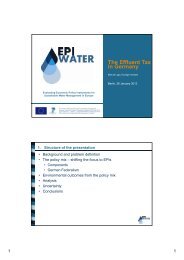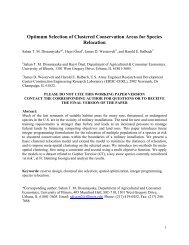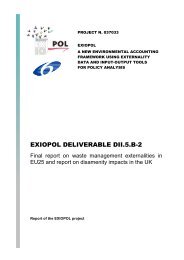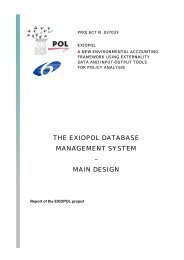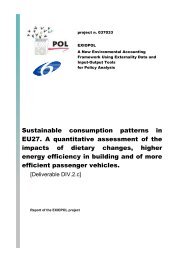Gulf and European Energy Supply Security - Feem-project.net
Gulf and European Energy Supply Security - Feem-project.net
Gulf and European Energy Supply Security - Feem-project.net
You also want an ePaper? Increase the reach of your titles
YUMPU automatically turns print PDFs into web optimized ePapers that Google loves.
prices that may be lower in the short term.<br />
It is normally considered that oil products<br />
markets are either free or administered, <strong>and</strong> the latter<br />
frequently means prices that are kept artificially low,<br />
because governments are reluctant to pass on price<br />
increases for crude oil to the final consumers. Indeed,<br />
the extensive reliance on administered prices in the<br />
developing countries, notably in the fast growing<br />
Asian countries, has been singled out as one reason<br />
for the rigidity of dem<strong>and</strong> relative to prices: dem<strong>and</strong><br />
is simply shielded from higher prices.<br />
What is proposed here is not a system of<br />
administered prices, but a set of regulations which<br />
would in essence encourage refiners <strong>and</strong> retailers<br />
to hedge on the futures market <strong>and</strong> lock in prices<br />
which they offer to their clients. Requesting retailers<br />
to “post” prices which can only be changed with, say,<br />
three months’ advance notice would probably yield<br />
the best results: competitors would be able to decide<br />
whether to follow the moves of the price leader <strong>and</strong><br />
price competition would still be possible. If prices<br />
need to be guaranteed over a set period of time,<br />
adjustments will be more difficult <strong>and</strong> competition<br />
will be discouraged. In all cases, coordination in view<br />
of price fixing needs to be repressed.<br />
The combination of advance notice <strong>and</strong> limits to<br />
the frequency of price changes would represent an<br />
increase of energy security for the final consumer<br />
per se. In theory, the final consumer could use<br />
the futures market <strong>and</strong> derivatives to reduce his<br />
risk <strong>and</strong> enhance his own security even in today’s<br />
conditions, but in practice this is beyond the means<br />
of most consumers. Only large consumers, such as<br />
airlines or shipping companies, have done so, <strong>and</strong><br />
they too are vulnerable to the threat of consumer<br />
infidelity whenever their final prices are higher<br />
than the competition. Regulations for encouraging<br />
systematic hedging would contribute to energy<br />
security overall.<br />
4.2 Price B<strong>and</strong>s<br />
The concept of a price b<strong>and</strong> has been around for<br />
some time as a way to dampen volatility through<br />
a maximum <strong>and</strong> minimum price target which<br />
would trigger action on the part of producers <strong>and</strong>/<br />
Functioning of the International Oil Markets <strong>and</strong> <strong>Security</strong> Implications<br />
or consumers as the market price approaches or<br />
crosses the extremes of the b<strong>and</strong>. OPEC had a<br />
notional price b<strong>and</strong> between 2000 <strong>and</strong> 2005. Robert<br />
Mabro, Christopher Allsopp <strong>and</strong> Bassam Fattouh<br />
of the Oxford Institute of <strong>Energy</strong> Studies have all<br />
argued in favor of a b<strong>and</strong>. Behrooz Baik Alizadeh of<br />
the Iranian Ministry of Petroleum has written, “In<br />
its 109th ordinary meeting in March 2000, OPEC<br />
unofficially introduced its price b<strong>and</strong> mechanism<br />
to the market. Within this mechanism, in the case<br />
of the average OPEC Basket crude price falling<br />
under $22/b for more than 10 successive working<br />
days, OPEC member states would be obligated to<br />
cut their daily production by 500,000 b/d, <strong>and</strong> in the<br />
case of the price exceeding $28/b for 20 successive<br />
working days, OPEC would increase production by<br />
500,000 b/d. Although OPEC took advantage of this<br />
mechanism only once, increasing production by<br />
500,000 b/d beginning on 31 October 2000, <strong>and</strong> gave<br />
up the whole idea in January 2005, introduction of<br />
this mechanism affected the market psychologically<br />
<strong>and</strong> stabilized prices during the period that OPEC<br />
was not inclined to change prices beyond specific<br />
limits.” 8<br />
The problem with any price b<strong>and</strong> concept is<br />
the instrumentation of intervention as the price<br />
approaches the limits. In the absence of appropriate<br />
instrumentation, it is not at all clear that the market<br />
psychology will be affected – indeed the market<br />
may be tempted to challenge the b<strong>and</strong> <strong>and</strong> test the<br />
will of governments trying to enforce the same.<br />
A price b<strong>and</strong> may be effective if it is agreed upon<br />
by both importing <strong>and</strong> exporting countries. It is not<br />
clear that such an agreement would ever be possible,<br />
although at present it appears that the target<br />
prices of both sides are very close. The interests of<br />
exporters <strong>and</strong> importers are in structural opposition,<br />
<strong>and</strong> the current convergence is likely to be an<br />
exception. However, it may not be excluded that<br />
the industrial countries’ concern for climate change<br />
<strong>and</strong> their desire to diversify their energy balances<br />
away from fossil fuels <strong>and</strong> specifically oil, <strong>and</strong> the<br />
exporting countries’ fear that oil might be penalized<br />
as a consequence, have indeed created a new order<br />
of priorities in the two sides, such that the importers<br />
no longer wish to minimize, <strong>and</strong> the exporters no




